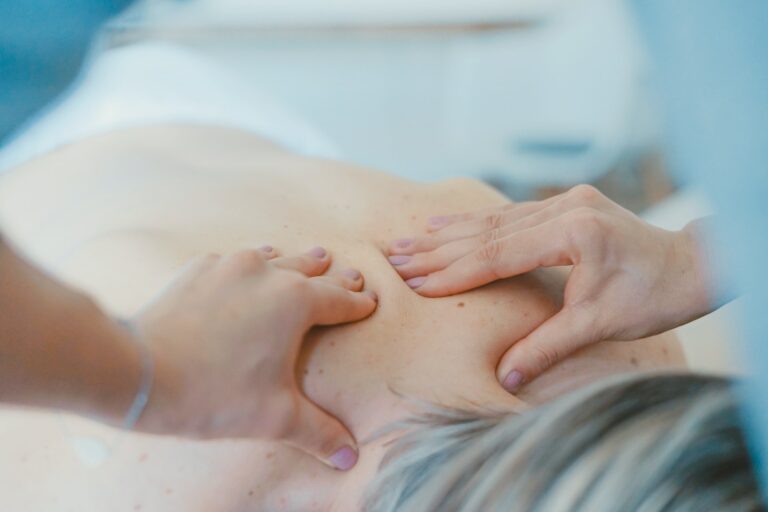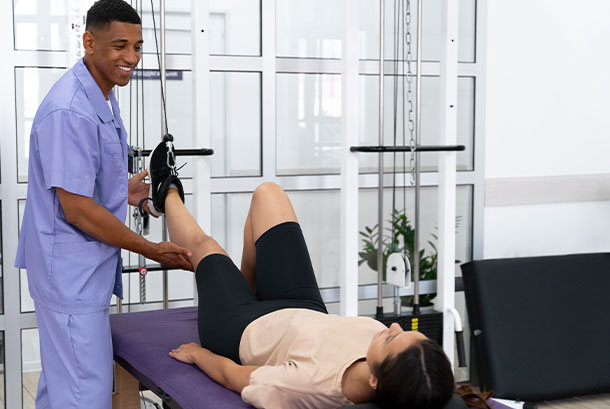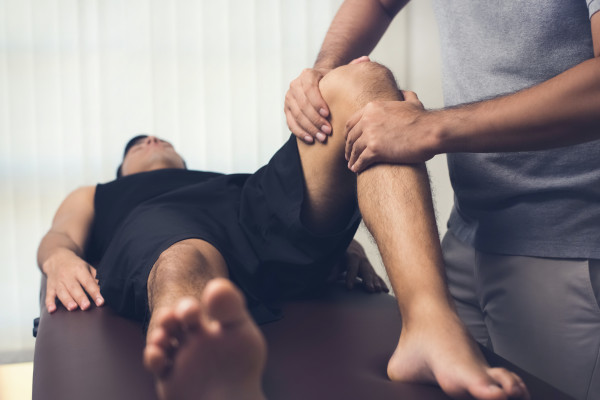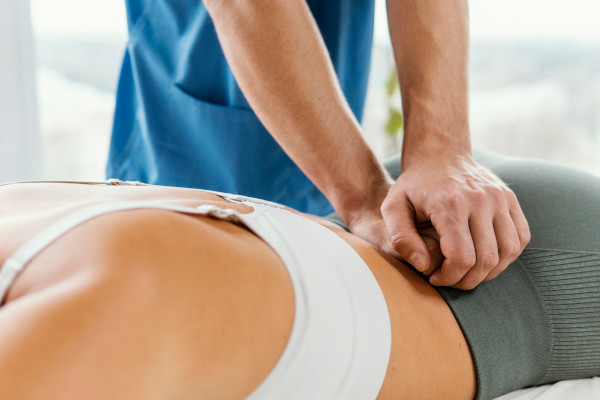Osteopathy Treatment
Osteopathy can help effectively treat back pain, neck pain and many other musculoskeletal symptoms by understanding the origin of your pain. We provide Osteopathy treatment for you, your children, your sports team and your business.
As a multidisciplinary healthcare practice with many years of expertise in osteopathy, we can care for you across our two clinics in Corsham and Swindon.
What is Osteopathy?
Osteopathy is a non-invasive, drug-free therapy applied to a wide range of medical conditions, with the aim to improve health throughout the entire body by strengthening the musculoskeletal framework.
Osteopathy uses manual ‘hands-on’ techniques to improve circulation and correct altered biomechanics, working with the structure and function of the body. It’s based on the principle that the well-being of a person is governed by the combined smooth functioning of the skeleton, muscles, ligaments and connective tissues.

What can Osteopathy help?
Osteopathic physicians can discover conditions that are not treatable through osteopathy, to be referred to other specialists. But osteopathy treatments can provide relief for a wide range of ailments, including:
- Back & neck ache
- Neuralgia
- Whiplash
- Minor sport injuries
- Sciatica
- Foot, ankle, knee and hip pain
- Work-related aches and pains
- Headaches
- Upper/lower body joint pains
- Postural problems
Osteopathy for Adults
Osteopathy can treat a range of musculoskeletal problems offering effective pain relief for issues such as back pain, joint pain, headaches & muscular strains.
Our osteopaths use a broad-range of techniques with a focus on tension-relief, muscle stretching and improved mobility. Combined with exercise and patient-specific advice designed to aid recovery, our practitioners can relieve pain and have you returning to normal activity as soon as possible.
When you choose osteopathy treatment at Carl Todd Clinics, you’re putting the health of your body in the hands of experienced professionals. We take a totally individualised approach to restoring you to full health, by ensuring that your body’s components are balanced and functioning smoothly.


Osteopathy for Children & Babies
When a baby is born, they can sometimes experience trauma during the stresses of labour, leading to many babies being born with odd-shaped heads and sometimes bruising. This will usually resolve itself within the first few days, but sometimes this isn’t the case.
You may find then that your baby experiences discomfort, and if not diagnosed, can lead to long-term effects. This is where cranial osteopathy can help. Correcting strains early on in life can allow your child to reach and express their full potential as an adult.
Cranial osteopathy is most recognised for the treatment of babies and young children due to its gentle approach. Our osteopaths can help to improve and restore the mobility of the cranial bones.
Osteopathy for Sports Teams
If you’re regularly active, sports injuries may be a common part of your daily life. How long your body takes to heal naturally will depend on the severity of the injury, but some injuries are too severe to leave.
Osteopathy treatment can help your body return to full fitness, quickly and efficiently. Our osteopaths can help you if you’re suffering from a strain or tear that needs repairing to get you back into the sport you love.
Our osteopaths specialise in the treatment and prevention of sports injuries. We help a wide range of people, from individual amateurs and people involved in recreational activities, right through to professional athletes and national sports teams.


Osteopathy for Your Employees
Back pain affects most people at one time or another. In the UK, it is the leading single reported cause of absence from work, accounting for 40% of sickness absence in the NHS and overall it costs £10 billion for the UK economy.
With 1 in 3 adults suffering with back pain every single day, why not consider osteopathy treatment as a workplace health benefit?
Offering osteopathy care for your team demonstrates that you care about their health and well being. Protect your employees; get in touch with Carl Todd Clinics and speak to us about treatment programmes today.
Osteopathy FAQs
Yes. Treatment modalities involve non-invasive and gentle approaches to health. They have proven to be remarkably safe, relying on relaxed movements, mobilisation and manipulation of joints along with soft tissue massage. No surgery or drugs are involved. We will explain the possible risks of treatment and discuss any worries you have before beginning your personalised treatment programme. You can be reassured that osteopathic care has helped millions of people over many years.
No, the treatment isn’t painful when performed by our qualified professionals. If your problem has been untreated for a while, you may experience some post-treatment soreness for up to 48 hours. This will soon pass as your body begins to adapt. But don’t worry – we’ll explain how to keep symptoms to a minimum.
This will depend on your individual problem and how long you’ve had it. Of course, every patient reacts differently, but we will be able to advise you on your likely recovery time. Your obvious commitment to the suggested treatment programme, including home exercises and any lifestyle alterations will also determine your progress and your long term benefits from our care.
In most cases you will feel a definite change for the better early on in your treatment plan. In general though, the longer you’ve had the problem or pain, the longer it will take to get it sorted.
At the beginning of your first session, the osteopath will ask you to tell them about your problem. They will ask questions about your medical history and lifestyle as well as your specific symptoms. This is very important, as it will help them to make an accurate diagnosis and suggest appropriate treatment.
At your next session, the osteopath will need to examine the area(s) of your body causing discomfort. Sometimes the cause of the problem may be in a different area to the pain, for example, a difference in leg length may result in compensations in the upper back which might result in neck pain, so they may need to examine your whole body.
Finally, a course of treatment will be suggested, which may require several visits and an estimate of how often you will need to be seen, along with any associated costs, usually by the end of the first session. If appropriate, treatment will begin at your first appointment, but sometimes your osteopath may require further tests first i.e. blood tests or scans. Very occasionally they may diagnose an illness that they feel they are unable to treat and may suggest that you consult your GP or another appropriate health professional.
Osteopathy Resources

Seeing your osteopath even when things are going well
One of the most common requests we get is something along the lines of “help, I’m broken, can you fix me?”, or words to that

Everything you need to know about cranial osteopathy
You may have come across osteopathy in relation to treating back and postural problems. Stretching muscles, ligaments and connective tissue and manipulating joints, to ensure

What is osteopathy and how can it help?
What is osteopathy? Osteopathy is a system of diagnosis and treatment applied to a wide range of medical conditions. It works with the structure and
Unsure if Osteopathy is right for you? Get in touch using the form or call one of our clinics to speak with us
Corsham Clinic: 01249 248392
Swindon Clinic: 01793 978270

